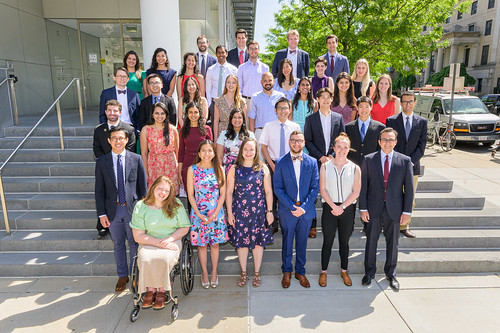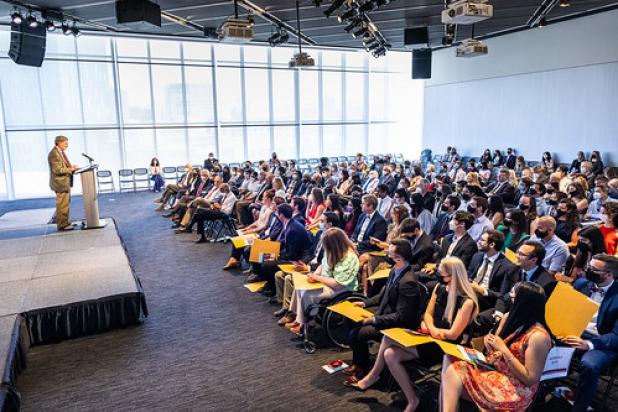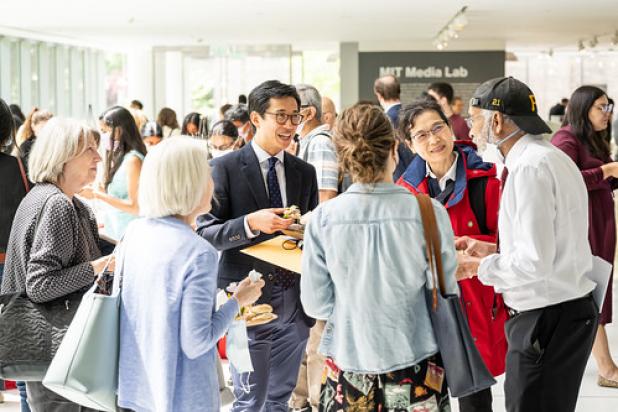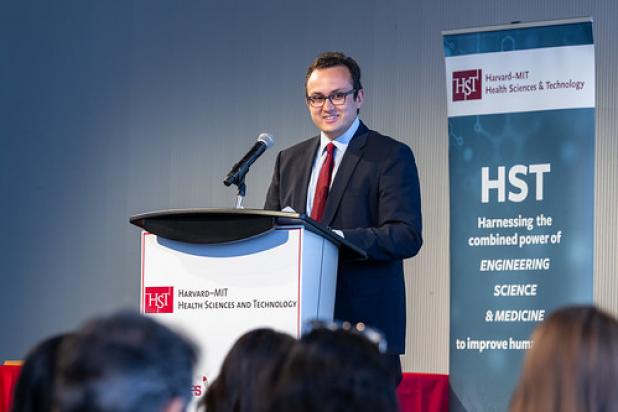
On Wednesday, May 25, the Harvard-MIT Program in Health Sciences and Technology (HST) held its graduation ceremony and celebration, in person at the MIT Media Lab, for the first time since 2019.
The 2022 HST graduates celebrate being together, as well as their successes, and hopes for the future
Mindy Blodgett | HST-IMES
After more than two years of doing so many things online (including two years of graduation celebrations via YouTube and Zoom), there was palpable joy in the spacious auditorium on the 6th floor of the MIT Media Lab building—where the 2022 Harvard-MIT Program in Health Sciences and Technology (HST) graduates were able to once again gather and celebrate together, in person. This year, there were 51 HST graduates, with 35 attending the in-person ceremony.
During the ceremony, which took place on Wednesday, May 25, on a warm, sunny day—the graduates were able to walk across the stage to accept their certificates, pose for pictures, and listen to their accomplishments extolled, live. They gathered together on the steps outside the building for a group photo; and family and friends, visiting from near and far, sat in the audience, snapping pictures and listening to congratulatory remarks from HST Associate Director Richard N. Mitchell, MD, PhD; Dean of Harvard Medical School (HMS) George Q. Daley, MD (HST ’91), PhD; and Elazer Edelman, MD (HST ’83), PhD (HST ’84), Director of the Institute for Medical Engineering and Science (IMES). Also participating in the ceremony were Emery N. Brown, MD, PhD, the outgoing co-director of HST, at MIT; and Wolfram Goessling MD, PhD, the co-director of HST at Harvard. (Collin M. Stultz, MD, HST ’97, PhD, is succeeding Brown as co-director of HST and associate director of IMES. IMES is HST’s home at MIT).
As is his custom, Mitchell, who served as emcee of the ceremony, wore his special HST graduation cap (a black Boston Red Sox baseball hat with a tassel), and he said it had been his privilege to teach many of this year’s graduates. He said the graduates have all “thrived and succeeded” but that they did so with the help of many of the faculty and leadership at the ceremony: “Like a turtle on a fence top, they didn’t get there by themselves.” He called their experiences of learning through a pandemic, “difficult, interesting” and he lauded them all for what they have accomplished, and will accomplish, in the future, “you’re all destined to make a real difference.”

HST Associate Director Richard N. Mitchell, MD, PhD, who served as the emcee for the event, addresses the 2022 HST graduates.
Goessling, and Junne Kamihara, MD (HST ’08), PhD, shared the presentation of the graduates of the Medical Sciences, Doctor of Medicine program; Brown presented the graduates of the Medical Engineering and Medical Physics, Doctor of Philosophy program, and Director of Education Julie E. Greenberg, PhD (HST ’94), presented graduates of the Graduate of Education in Medical Sciences (GEMS) certificate program.
Dean Daley, during his remarks, said that as an HST alumnus, he was proud to speak at the ceremony, and he said that the program “represents the pinnacle of what is possible” when two institutions like Harvard and MIT collaborate, as they do to sustain HST. He listed some of the special projects accomplished by 2022 graduates, including serving as first authors of more than 50 research papers; and building a control system for a single-ventricle heart-assist device. He lauded this graduate class for viewing advances in medicine “through the lens of health inequities…you care deeply about evaluating social determinants…the world needs you.”

Outgoing HST co-director, Emery N. Brown, MD, PhD, (right) speaks to attendees at the reception following the 2022 HST graduation ceremony.
Brown introduced Edelman, who, pointing out that it was Brown’s last commencement as HST co-director, then described Brown as a person “of the highest scholarship and amazing empathy.”
During his remarks, Edelman spoke of how “pandemics and armed conflict” have always shaped medicine, pointing out that medical schools were founded during the Middle Ages, after the brutality of the Crusades and the scourge of global plagues. He mused that many leading medical leaders from history did their most important work while they were medical students. And he cited the “extraordinary array of talents…and the yearning for public service” among the ranks of HST students as the basis for the “greatness of IMES and HST.”
Kameron A. Kooshesh, a 2022 HST MD graduate, used his student address to not only congratulate his fellow graduates, but to thank the HST leadership and staff for working so hard to ensure that the disruptions of the pandemic did not dampen the HST experience. “The class of 2022 faced unique challenges,” he said, but the HST program still gave its students instruction from a unique perspective, “steeped in historic achievements in medicine, and science,” and, he said, it imparted key, core principles from which to approach problems. No matter where their careers lead them, he said, HST students will take with us the “lessons of where we began.”

Kameron A. Kooshesh, 2022 HST MD graduate, gives the student address.
HST MD graduates also participated in Harvard graduation events on May 26, and graduates of the HST Medical Engineering and Medical Physics (MEMP) PhD program received their degrees during the MIT Commencement ceremony on May 26 as well.
Doctor of Medicine; Medical Science
Radikha Agarwal, BS, PhD
Cum laude
Deciphering the Molecular Mechanisms of ALPK3- and FLNC-cardiomyopathy
Alice Catherine Bosma-Moody, BS
Transcriptomic Correlates of Exposure to Anti-Androgen Therapy in Advanced Prostate Cancer
Ken Chang, BNG, MNG, PhD
Enhancing Medical Imaging Workflows with Deep Learning
Jennifer Cloutier, BA, PhD
Activin Signaling Controls a Wound-induced Program Essential for Regenerative Patterning
Jonathan D. D'Gama, BA, PhD
Studies on Pathogenic Bacteria Using Genetic and Genomic Approaches and a Novel Small Animal Model
Samuel Finlayson, BA, MS, PhD
Learning Inductive Representations of Biomedical Data
Jon Hochstein, BS
A Circulatory Support System for Univentricular Hearts with Fontan Physiology
Travis Hughes, BS, MPH, PhD
Rose Seegal Prize
Understanding the Cellular Ecology of Mtb Granulomas Using Single-Cell Sequencing
Bailey Ingalls, BS
Optimization and Advancement of Injectable Drug Delivery
Sebastian Koochaki, BS, MS, PhD
CBL and the Negative Regulation of Cytokine Receptor Signaling
Kameron Allen Kooshesh, BA
Magna cum laude
The Thymus is Essential for Adult Immune Function
Dylan Kotliar, BA, PhD
Cum laude
A Genome-wide Association Study Identifies Host Genetic Variants Associated with Susceptibility to Lassa Fever
Thúy-Lan Võ Lite, BA, PhD
The Genetic Landscape of Protein-Protein Interaction Specificity
Derek Liu, BS
Transcriptomic Correlates of Response and Resistance to Immune Checkpoint Blockade in Metastatic Melanoma
Alexander Munoz, BA
Magna cum laude
Seidman Prize for Outstanding HST Senior Medical Student Thesis
Transcriptomic Profiling of Mosaic Chromosomal Alterations at Low Cell-Fractions in the Adult Human Brain Identifies Clonal Gliopoiesis
Mark Aurel Nagy, BS, PhD
Magna cum laude
A Scalable Platform for the Development of Cell-Type-Specific Viral Vectors
Nathan Joel Nakatsuka, PhD
James Tolbert Shipley Prize
London Society Multiculturalism Award
Integrating Ancient and Modern DNA To Study Human History in South Asia and the Americas
Atousa Nourmahnad, BS
Collagen Glycosaminoglycan Bioscaffold Improves Skeletal Muscle Recovery in a Murine Model of Volumetric Muscle Loss
Sigurast Soley Olafsson, BS
Human Embyonic Stem Cell Derived Cardiomyocyte Model of Naxos Disease Associated Arrhythmic Cardiomyopathy
David Tyler Severson, BA, BS, DPhil
Magna cum laude
Understanding Histologic Heterogeneity in Malignant Pleural Mesothelioma
Sarah Shareef, BS, MS, PhD
Henry Asbury Christian Award
Quantifying DNA Methylation and Heterogeneity in Cancer with Single Cell Resolution
Julie Urgiles, BA
Target Engagement Studies and PROTAC Derivatization of Small Molecule KARV3
Emory Lynne Werner, BA
Signal of Polygenic Adaptation in Hematologic Traits
Winston Xia Yan, BA, PhD
Towards Therapeutic Applications of CRISPR-Cas Nucleases: Developing Technologies for In Vivo Gene Editing & Evaluating Genome-wide Specificity
Doctor of Philosophy in Medical Engineering and Medical Physics
Melodi Anahtar, SB
Protease Activated Nanosensors for the Noninvasive Diagnosis of Community-acquired Pneumonia
Marc-Joseph Antonini, SM, ENG
Customizing Multifunctional Bidirectional Neural Interfaces through Fiber Drawing
Paul Dannenberg, SB
Scalable Development of Multiplexed Microparticle Technologies for Optical Single-cell Barcoding
Shoshana Das, SB
Engineering Three Dimensional In Vitro Approaches to Study Cardiac Injury and Repair
Luke Funk, SB
Image-based Pooled Genetic Screens for Complex Cellular Phenotypes
Markus Attila Horvath, SB, SM
A Multimodal Approach to Investigate the Effects of Respiration on Fontan Flow to Inform Strategies for Circulatory Support
Lucy Hu, SB
Soft Robotics Applied to the Development of a Diaphragm Assist System
Szu-Yu Lee, SB, SM
Imaging Through Optical Multimode Fiber: Towards Ultra-thin Endoscopy
Vamsi Mangena, SB
Leveraging Human Brain Organoids for Studying Malignant Cell States and Intercellular Communication in Glioma
Nicolas Meirhaeghe, SM
Neural Encoding of Prior Experience in Sensorimotor Behavior
Eric Michael Moult, BNG
Optical Coherence Tomography Angiography for Imaging and Analysis of the Choriocapillaris in Late Age-Related Macular Degeneration
Richard Joshua Murdock, SB
Modular Magnetic Relaxation Nanomaterial Biosensor Platform for Local, Integrative Chemical Monitoring
Erin Byrne Rousseau, SB
Tools for Monitoring and Modulating Cellular Communication
Sandya Subramanian, SB, MPhil
Measuring Nociception Under Anesthesia
Kriti Subramanyam, SB
Chemotherapy-Eluting Intraperitoneal Implants for Advanced Stage Ovarian Cancer Treatment
Christina Myra Tringides, SB
Designing Viscoelastic Bioelectronic Interfaces: From the Organ to Cell Scale
Claudia Elena Varela, SB
Device-enabled Biomechanical Modulation of the Infarcted Heart
Simon Huang Ye, SB
Metagenomic Sequencing for Viral Diagnostics and Discovery
Certificate in Graduate Education in Medical Sciences
Monica Agrawal, SB, SM
Towards High-Quality Structured Data from Clinical Notes (pending)
Irene Yunshien Chen, BA
Machine Learning Approaches Towards Equitable Healthcare
Elad Deiss-Yehiely, SB
Layer by Layer Nanoparticles for Enhanced Biofilm Penetration and Antimicrobial Delivery
Marie Shi Feng, SB
Improving Qualify and Throughput of Online Help in Large Programming Classes
Alexander T. Jaffe, SB, MNG
Force-Coupled Ultrasound Imaging of Large Superficial Blood Vessels to Determine Arterial and Venous Pressures
Clara Park, SB, SM
Development of a High-Fidelity Biorobotic Cardiovascular in Vitro Simulator
Miguel Reyes, BNG, PhD
Profiling, Prototyping, and Perturbing Human Immune Responses
Mary Claire Strawser, SB, SM
Density-shift Immunomagnetic Separation for Pathogen Retrieval from Complex Media
Cristina Coralys Torres Cabán, SB
Technology Development for the Functional and Structural Analysis of the Brain
*Final degree lists were not available at time of publication so the list is subject to change. Official degree certifications should be requested directly from the MIT or HMS Registrar’s Offices.